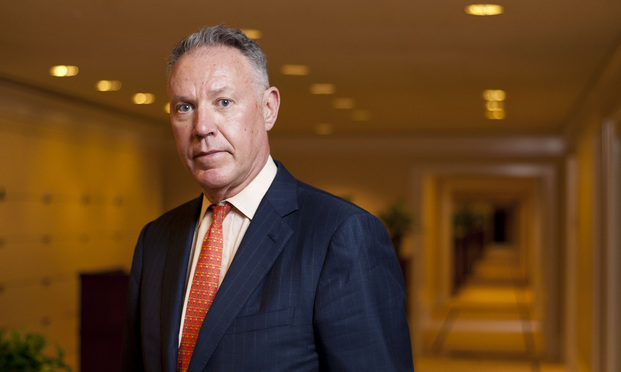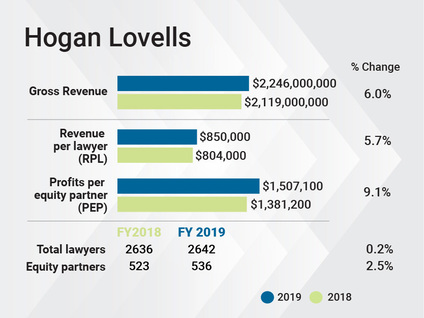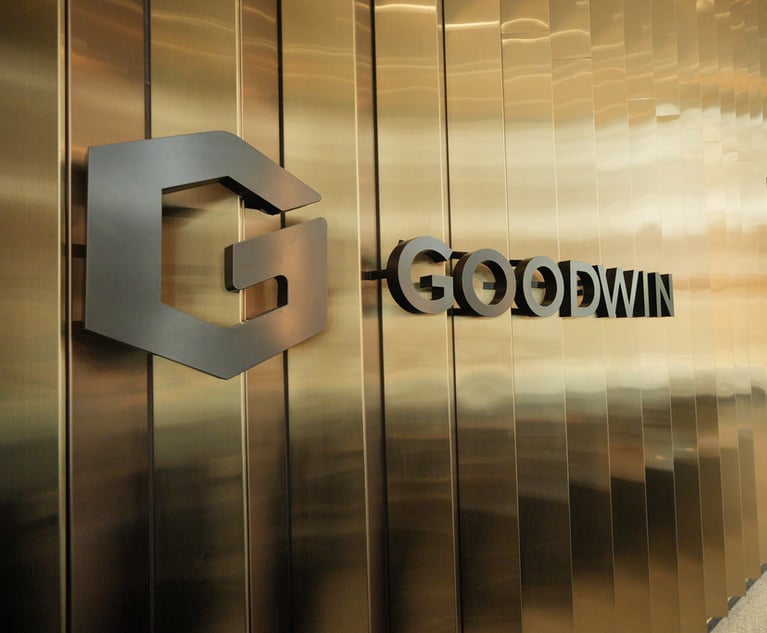Hogan Lovells Revenues Climb For Seventh Straight Year
CEO Steve Immelt, who is stepping down after six years at the end of June, highlighted balanced growth across the firm's practices.
February 20, 2020 at 07:01 PM
5 minute read
The original version of this story was published on The American Lawyer
 Stephen Immelt. (Photo: Diego M. Radzinschi/ALM)
Stephen Immelt. (Photo: Diego M. Radzinschi/ALM)
Hogan Lovells posted its seventh consecutive year of growth in 2019, as total global revenue climbed 6% to $2.25 billion.
Profits per equity partner grew 9.1% to $1.51 million, while revenue per lawyer increased by $5.7% to $850,000.
"The good thing about 2019 is that we saw pretty balanced growth," said Washington, D.C.-based CEO Stephen Immelt. "It was not driven by any one sector or one huge matter."
The Americas represented approximately half of the firm's total billings in the previous year. The U.K. and Continental Europe together accounted for another 43%, while Asia Pacific and the Middle East provided the remaining 7%. Revenue from London and the U.K. grew over 10% to £332.6 million.
Deal flow recovered in the second half of 2019 after a slow start to the year, according to Immelt, while the firm's litigation, regulatory and IP practices—less tied to market fluctuations—performed impressively over the full year.
Immelt, who is stepping down from his position in July after six years at the helm, has stressed repeatedly that the firm has been prioritizing sector-based expertise. Viewed along those lines, the automotive industry and financial institutions were standouts.
 For the former, the rise of connected cars, electric vehicles and other advancements is fueling dealmaking to license or buy new technologies, while manufacturers are facing increased regulatory scrutiny along with a continued need for financing. Financial institutions, meanwhile, have been facing uncertainty not just from Brexit but the phasing out of the Libor benchmark for inter-bank lending.
For the former, the rise of connected cars, electric vehicles and other advancements is fueling dealmaking to license or buy new technologies, while manufacturers are facing increased regulatory scrutiny along with a continued need for financing. Financial institutions, meanwhile, have been facing uncertainty not just from Brexit but the phasing out of the Libor benchmark for inter-bank lending.
Hogan Lovells' head count remained largely steady in 2019, with over 2,600 attorneys worldwide. Its number of equity partners ticked slightly upward to 536, expanding by 2.5%, with part of the growth coming from changes in South Africa. There, the firm unwound a six-year-old affiliation with a local firm and launched a new fully integrated office with five partners.
The firm also launched a legal services center in Berlin in June, supporting white-collar, investigations and fraud work, and a document review center in Phoenix in December, in conjunction with law company Elevate.
"It's price competitive," said London-based deputy CEO David Hudd, who is also stepping down at the end of June. "That is going to continue to be an important part of our evolution, in terms of how work is going to be delivered."
The firm did raise rates more than 3% in 2019, at a level that Immelt said was consistent with the rest of the market, and further increases are in the works for this year.
"The good news from our perspective is that we were able to capture a good percentage of the rates we introduced in 2019," he said. "It's not automatic. Clients need to feel that [these are] consistent with peer firms and that they're getting value at the end of the day."
While the firm's finance clients in London have been using alternative financial arrangements for two decades, the appetite for these is growing in practices like litigation and in regions like the U.S. But even with a movement towards fixed fees, caps and hard budgets, Immelt recognizes some limits in what will change
"I personally think that sometimes the clients are the ones who are more reluctant to move away from hourly-rate billing," he said.
Looking ahead to the rest of 2020, both Immelt and Hudd said they are comfortable with the firm's global footprint and do not expect to expand into any new markets. But they are eyeing growth in New York, California and London.
And as the two prepare to move on from leadership, they had several thoughts on how they would advise their successors: incoming CEO Miguel Zaldivar, a project finance specialist who's currently based in Hong Kong, and deputy CEO Michael Davison, a London-based international arbitration attorney.
"This is a dynamic and unpredictable business. Be ready for things you can't envisage," said Hudd, pointing to Brexit, the election of Donald Trump and other signs of a global turn towards populism that would have been hard to detect when they started in their roles in the middle of 2014.
"But the advantage of a firm like this is that we're broadly based, and not overly dependent on one region," Hudd added. "We're widely hedged, and should keep that hedging in place.
For Immelt, it's valuable to constantly look for new opportunities in the world. He pointed to a decision 15 years ago, while at predecessor firm Hogan & Hartson, to explore hiring an expert in privacy work.
"We now have 200 lawyers who are dealing with privacy," he said. "It's hard sometimes when you've got a lot of work on your desk. But you need to look around and see what the next opportunity is going to be."
The 2019 financial figures reported in this story are preliminary. ALM will report finalized data for the Am Law 200 in The American Lawyer's May and June issues.
Read More
Hogan Lovells Confirms New CEO and Deputy CEO
Revenue, Profits on the Rise for Transatlantic Hogan Lovells
This content has been archived. It is available through our partners, LexisNexis® and Bloomberg Law.
To view this content, please continue to their sites.
Not a Lexis Subscriber?
Subscribe Now
Not a Bloomberg Law Subscriber?
Subscribe Now
NOT FOR REPRINT
© 2025 ALM Global, LLC, All Rights Reserved. Request academic re-use from www.copyright.com. All other uses, submit a request to [email protected]. For more information visit Asset & Logo Licensing.
You Might Like
View All
Hogan Lovells Johannesburg MP Joins ALN; Firm Relocates Partner to D.C. After Closure
3 minute read
Goodwin Enlisted for $1.15 Billion GSK Acquisition of US Biopharma Business

Cassels Brock Takes Centre Stage in Landmark Canadian Securities Law Case
5 minute read
Goodwin Hires Quinn Emanuel Antitrust Partner to Launch Brussels Office
3 minute readTrending Stories
- 1Supreme Court Appears Sympathetic to Law Requiring Porn Sites to Verify Users' Age
- 2Cybersecurity Breaches, Cyberbullying, and Ways to Help Protect Clients From Both
- 3AI in 2025: Five Key Predictions on How It Will Reshape International Law Firms
- 4Justice Known for Asking 'Tough Questions' Resolves to Improve Civility
- 5Robinson & Cole Elects New Partners and Counsel
Who Got The Work
J. Brugh Lower of Gibbons has entered an appearance for industrial equipment supplier Devco Corporation in a pending trademark infringement lawsuit. The suit, accusing the defendant of selling knock-off Graco products, was filed Dec. 18 in New Jersey District Court by Rivkin Radler on behalf of Graco Inc. and Graco Minnesota. The case, assigned to U.S. District Judge Zahid N. Quraishi, is 3:24-cv-11294, Graco Inc. et al v. Devco Corporation.
Who Got The Work
Rebecca Maller-Stein and Kent A. Yalowitz of Arnold & Porter Kaye Scholer have entered their appearances for Hanaco Venture Capital and its executives, Lior Prosor and David Frankel, in a pending securities lawsuit. The action, filed on Dec. 24 in New York Southern District Court by Zell, Aron & Co. on behalf of Goldeneye Advisors, accuses the defendants of negligently and fraudulently managing the plaintiff's $1 million investment. The case, assigned to U.S. District Judge Vernon S. Broderick, is 1:24-cv-09918, Goldeneye Advisors, LLC v. Hanaco Venture Capital, Ltd. et al.
Who Got The Work
Attorneys from A&O Shearman has stepped in as defense counsel for Toronto-Dominion Bank and other defendants in a pending securities class action. The suit, filed Dec. 11 in New York Southern District Court by Bleichmar Fonti & Auld, accuses the defendants of concealing the bank's 'pervasive' deficiencies in regards to its compliance with the Bank Secrecy Act and the quality of its anti-money laundering controls. The case, assigned to U.S. District Judge Arun Subramanian, is 1:24-cv-09445, Gonzalez v. The Toronto-Dominion Bank et al.
Who Got The Work
Crown Castle International, a Pennsylvania company providing shared communications infrastructure, has turned to Luke D. Wolf of Gordon Rees Scully Mansukhani to fend off a pending breach-of-contract lawsuit. The court action, filed Nov. 25 in Michigan Eastern District Court by Hooper Hathaway PC on behalf of The Town Residences LLC, accuses Crown Castle of failing to transfer approximately $30,000 in utility payments from T-Mobile in breach of a roof-top lease and assignment agreement. The case, assigned to U.S. District Judge Susan K. Declercq, is 2:24-cv-13131, The Town Residences LLC v. T-Mobile US, Inc. et al.
Who Got The Work
Wilfred P. Coronato and Daniel M. Schwartz of McCarter & English have stepped in as defense counsel to Electrolux Home Products Inc. in a pending product liability lawsuit. The court action, filed Nov. 26 in New York Eastern District Court by Poulos Lopiccolo PC and Nagel Rice LLP on behalf of David Stern, alleges that the defendant's refrigerators’ drawers and shelving repeatedly break and fall apart within months after purchase. The case, assigned to U.S. District Judge Joan M. Azrack, is 2:24-cv-08204, Stern v. Electrolux Home Products, Inc.
Featured Firms
Law Offices of Gary Martin Hays & Associates, P.C.
(470) 294-1674
Law Offices of Mark E. Salomone
(857) 444-6468
Smith & Hassler
(713) 739-1250








